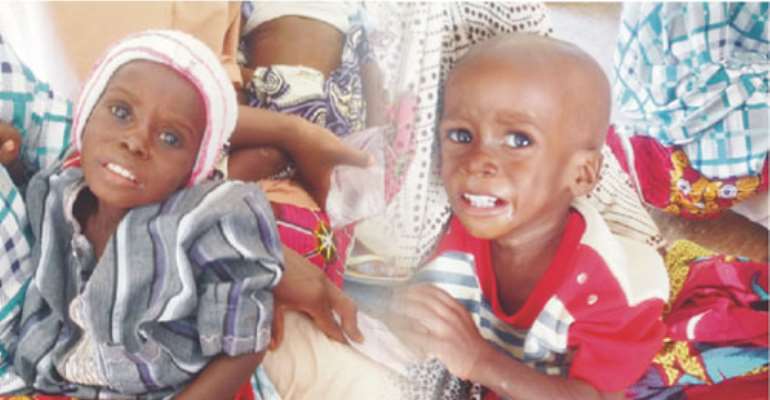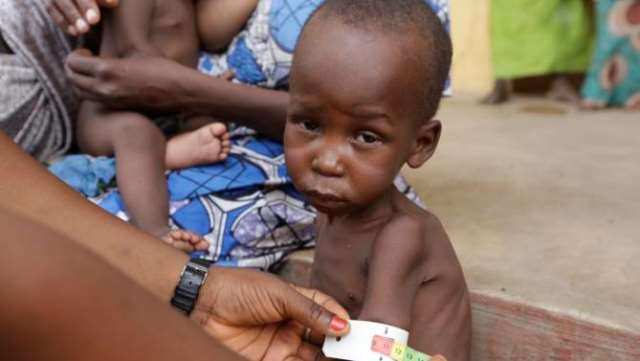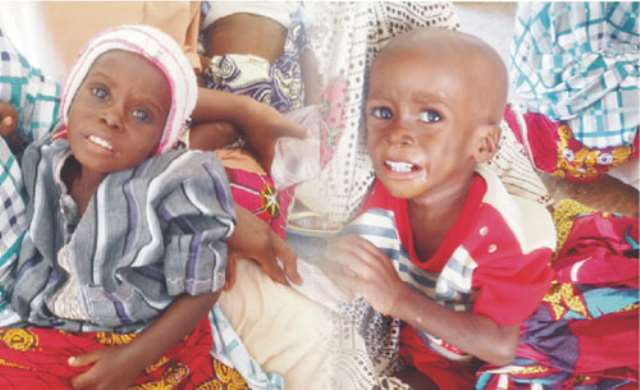Millions Expected To Die In Nigeria Due To Poor Finances For Feeding

5.2 million people are expected to be seriously affected by malnutrition by August this year, from the 4.7 million the WFP says are currently affected in North-East, Odimegwu Onwumere writes that investigations reveal that the number of children currently malnourished and sick in Nigeria is apparently more than the population of some countries
"Hundreds of thousands of Nigerians could starve to death in the famine-threatened North-East due to lack of aid funds," the United Nations warns on May 24, 2017.
The United Nations Children’s Fund (UNICEF) figures picture that numerous children are affected by malnutrition in the country. In Katsina, Kebbi, Jigawa, Yobe, and Zamfara States, experts at Working to Improve Nutrition in Northern Nigeria (WINNN), exclaim, "As a result of malnutrition, 58 per cent of children under five in these states suffer from stunting, meaning their physical and mental development have been impaired.”
But despite this, authorities seem not to be working round the clock to arrest the situation, even as WINNN adds, “An estimated 370,000 children with severe acute malnutrition in these states will require lifesaving treatment this year, while 183,352 breast feeding women are malnourished. Without urgent intervention, some 70,000 of those children are likely to die."
Twenty Million People In Danger
Nigeria is among countries like Somalia, South Sudan and Yemen that the UN says pose the jeopardy of malnourishment and where 20 million people are in danger due to draught and conflict and will be dubbed "the world’s worst famine for decades".
The U.N’s Financial Tracking Service (FTS), articulates, "Nigeria’s humanitarian appeal is the least funded. Nigeria’s aid response plan for 2017 has received $241 million of a requested $1.05 billion to date, of which the WFP’s demand for $300 million to provide life-saving food aid in the North-East has only been a sixth funded."
This has raised sharp fear that only this June, the UN can merely assist 1.3 million of those most in need, as against the 1.8 million people it had before tabled to provide aid to.
The genuineness of this is that apart from the North-East, malnutrition and stunting are besetting the growth and development of children in most Nigerian towns and villages.
Hundreds Of Thousands Of Children Dying
The UNICEF says that in 2016 alone, the South-East geo-political zone of Nigeria had a number of 34, 889 malnourished children, while 6, 700 deaths were recorded.
The same was pertinent to the South-South zone, with a total of 86, 304 malnourished children, and 16, 700 deaths; while in the South-West, there were 84, 417 cases of malnourished children and 16, 300 deaths.
The source goes further to reveal that the North-West zone had 1,594, 462 bags of the ugly omen and 308, 000 deaths.
The North-Central had 43,635 toll of malnourished children with 8,400 deaths; and North-East had 695,998 cases and 134, 000 deaths.
Millions Of Dollars Needed
At a media discourse with the theme – Investing in Child Malnutrition For the Future – Mrs. Philomena Irene, UNICEF Nutrition Specialist says that there are 2.5 million children on the index to be treated for malnutrition, but about 500 have been treated; all simmer down to poor funding.
“$107 million is needed for treatment of malnourished children in Nigeria, but just $21.5 million have been realised, leaving a shortfall of $85.5 million,” as according to UNICEF, adding, “Only $5 is needed to prevent malnutrition in a child while a total of $71 is needed to treat each malnourished child.”
It is believed that sixty-six percent of children are malnourished in the country and the percentage is expected to increase due to the WFP heralding apocalyptic famine in Nigeria.
According to the WFP’s regional director Abdou Dieng in a statement to the Thomson Reuters Foundation in Dakar, Senegal, "We need $250 million to prevent famine in Nigeria in the coming months.”
Effects Of Hunger
This plight is however moving groups and individuals to warn of the effects of malnutrition on children.
Those who know better say that the worrisome aspect is that the blights are not being handled with the attention they needed despite WFP dwindling efforts in feeding people in the affected areas.
“If we don’t get the funding, hundreds of thousands of people could die of hunger,” says Dieng, adding, "Hunger levels would increase as the rainy season restricted aid delivery and continuing insecurity limited the population’s ability to farm."
But before this revelation, there were media reports suggesting that, “Available statistical estimates show that no less than half a million Nigerian children aged five and below die yearly as a result of malnutrition, hence, investing in nutrition will yield valuable returns.”
Between Health And Nutrition
At a workshop organised recently in Kaduna to point out aspects of leakage in media coverage of health and nutrition questions, Beatrice Eluaka frowns at the health and nutrition financing vacuums in Nigeria.
For Prof. Sandy Thomas, the Director of the Global Panel on Agriculture and Food Systems for Nutrition on investing in nutrition, “Meeting the 2015 World Health Assembly target for stunting will add 29,7 billion to Nigeria’s income.’’
Eluaka who is the project director of CS-SUN, a Civil Society Organisation and member of the PACFaH coalition, observes, “The Nigeria demographic and health survey (NDHS) 2013 reported the national prevalence of stunting at 37%, underweight 29%, and wasting 18% in children under five years old.
“The worst hit regions in Nigeria for stunting are the North-West and North-Central which have 54.8% and 29.3% respectively.”
There is apprehension that stunting children hardly recover from the peril they incur due to malnutrition. In Enugu, Henrietta Ugwu, who is the Enugu State Nutrition Officer bares her fears that immediately a child is above the 1000 days expected of a child to have adequate nutrition, the chance of rescuing the child is slim.
In an examination by correspondent Doyin Ojosipe, May 18, 2017, Ugwu says, “Malnutrition is something that is irreversible because what you may be seeing is the physical appearance of the child.”
The statement goes further, “The damage has been done in the brain, that the child may not attain in terms of development, in terms of growth, in terms of every other thing, even workforce when he comes of age he may not be able to contribute excellently to the economic development of a nation as other children that were well taken care of.”
Exclusive Breastfeeding
Mrs. Irene says that malnutrition has made Nigeria to be among the highest contributors to under-five child mortality in the world. “Unfortunately, only 17 percent of nursing mothers in Nigeria engaged in exclusive breast feeding for their children.
“From the birth to a child’s six months, they are not to be given water, all they needed in order to boost their immune system, is the breast milk.”
This is even as Dr. Bamidele Omotola, another Nutrition Specialist at the UNICEF, enthuses, “Between when a baby is conceived to when the baby is two years old, over 90 percent of the brain is formed to adult size but because of malnutrition, because the mother did not feed on proper nutrition when pregnant, it affects the formulation of the brain cells and because the brain is the center where the baby is able to manipulate, conjuncture things, that ability will also be lost.”
However, Mrs. Irene further notes, “If government does not spend the $1 needed to prevent malnutrition now, $16 would be spent on numerous diseases that malnutrition causes in the future.” It is therefore hoped that Nigeria will receive the funds required to avert the amplified number of 5.2 million citizens from starving to death.
Odimegwu Onwumere is an award-winning journalist based in Rivers State, Nigeria. He contributed this piece via: [email protected]


